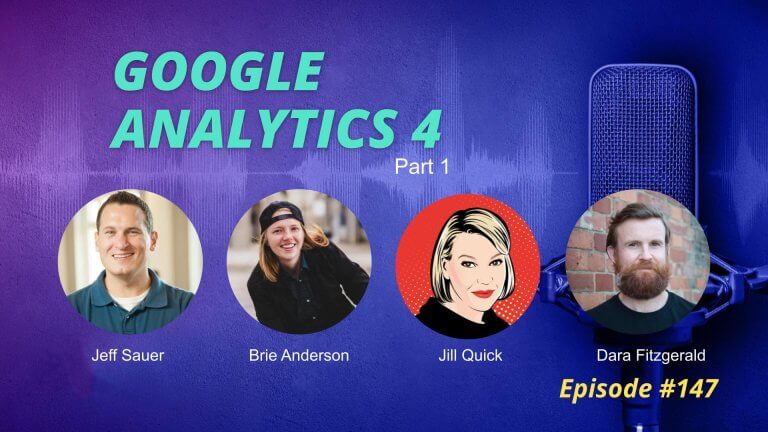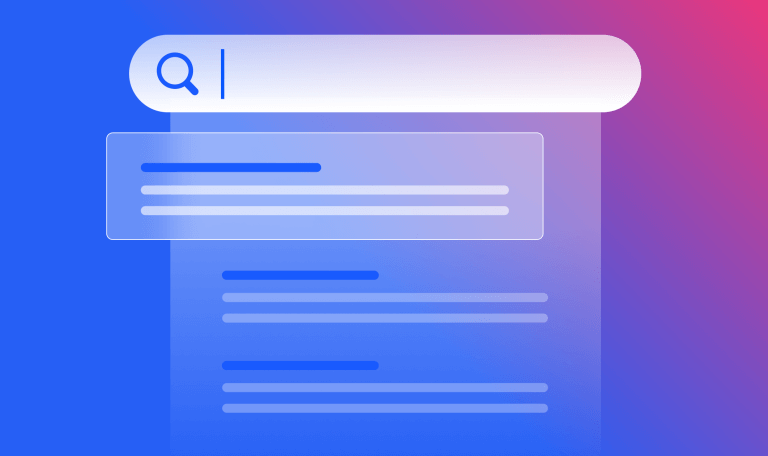In Search Podcast: How Has Google Analytics Evolved?

How has Google Analytics evolved? And what are we going to lose when Universal Analytics goes away?
Welcome to part one of a three-part discussion about Google Analytics 4. And in this episode, we’re going to be looking at how Google Analytics has evolved and what we’re going to lose when Universal Analytics goes away.
Taking part is Jeff Sauer, founder of Jeff Analytics and Data-Driven U, Brie Anderson, owner of Beast Analytics, Jill Quick, analytics consultant and trainer from The Coloring In Department, and Dara Fitzgerald, CEO and co-founder at Measurelab. Jeff, could I ask you to start with a whistlestop history of Google Analytics?
In this week’s episode, our panel will help you understand Google Analytics 4, including:
- The history of Google Analytics
- How Google Analytics has changed
- What SEOs will lose by moving over to Google Analytics 4
- What SEOs should know to embrace Google Analytics 4
How Has Google Analytics Evolved?
History of Google Analytics
Jeff Sauer [JS]: Yeah, so going back to 1999, when it was started, it was called Urchin and it was developed as a separate company entirely. It was a web analytics log platform that you had to host in your own servers in order to get anything. And then around 2004 or 2005, Google bought it, rebranded it as Google Analytics, moved it to the client side, implemented a lot of JavaScript libraries and so on, and put it out there. But it was really made to measure the desktop web, one person, one device, that’s the type of world it was in, and over the years it got better and better. They improved the interface and made it awesome. It became the industry standard, it put a lot of competitors out of business.
And then it started to become a dinosaur towards the mid and late 2000 and teens and started to slow down. Privacy became important and all kinds of stuff were happening. And then suddenly, we’re in a situation where we wonder if we even need analytics anymore. We need the data but is Google Analytics the right platform anymore? And that was the last few years. Also, Google is getting sued almost daily because of the archaic architecture of a 1999 system. Basically, if you had put a code on your site back in 2005 after Google acquired it, it still works today on Universal. So GA4 and the newest version is sort of Google’s way of cleaning up the sins of the past and trying to modernize it into the future. And it’s been something that we’re all cautiously optimistic that it’s going to bring us to the promised land.
How has Google Analytics changed?
DB: It’s funny, I remember actually just starting to use an analytics package just before Urchin and I used StatCounter at the time. Does anyone remember using that? Brie, what are your thoughts in terms of how Google Analytics has changed?
Brie Anderson [BA]: Jeff said it brilliantly and hit a lot of the big things. I try to remind my clients that a lot of things have changed. Universal Analytics rolled out in 2012. And if you think about what web browsing looked like at that time. Everything was an app, we were starting to make that transition into the fact that 80% of browsing was happening on our phones when all of our phones had access to the internet. And that’s what was becoming the main way to interact with websites.
We were also making that transition away from that m.facebook.com. It was no longer having a mobile site and a desktop site. Google was starting to change to mobile-first indexing. Everyone was having to make their sites more mobile-friendly.
We need to realize what the user journey looks like these days. You can browse the internet on your TV if you wanted to. I don’t personally want to, but you can. We had to account for those things. The fact that I have 5 devices that I can browse the internet on is why Google is trying to make up for what those user journeys look like. We’ve also been hit with things like iOS 14.5, a whole bunch more cookieless browsing happening that GA4 wanted to account for. If you look at the very first announcement for GA4 back in 2020, they call it the analytics of the future. And what that just meant was Google’s trying to future-proof itself because they knew that they were falling behind very quickly and if they didn’t make a change people were going to have to be leaving the platform.
DB: Jill, Brie mentioned mobile browsing and internet TV as well, I guess those were two things that Google didn’t really envisage back in 2005.
Jill Quick [JQ]: No. And I have an analogy that I use to explain the evolution of analytics to try and help people go through the neurological pathway changes of getting used to a different model. As Jeff mentioned, with it being around since 1999, if Analytics was a mode of transportation, then Urchin would have been a bicycle. Classic would have been a moped, bit of an engine to scoot around your data. Universal is a car, and we all love our car, and you’ve either been a passenger, a driver, or maybe the engineer. I have met some people that don’t know where the car is parked, or who has the keys. You have all those problems as usual. GA4 however, is a helicopter. And even though there were some similarities between the two, they both have doors and seatbelts and windows, it is a completely different model.
And half of the challenge of getting people to understand why we’re moving from the car to the helicopter is that you can’t expect GA4 to act like Universal, it’s just not going to happen. And that is one of the big challenges that you have, learning something new. Google has made these changes, rightly because of privacy but you’ve got to remember that this isn’t even Google, this is Alphabet, 80% of their revenue comes from Google Ads. And the old car that was creaking near the end was making it difficult for them to do that and track this legally. This is a way for them to also protect their business model.
There are a lot of things that are moving. I think they are setting the car on fire this year. I don’t think people are going it’s fine, it is going to get set on fire. Apart from those that have a sports car, the 360s of the world, they will have longer because they just need more runway literally, to get things done.
DB: Dara, in terms of different vehicles, you’ve been the passenger, the driver, and the engineer for each vehicle that Jill was talking about there. Tell us a little bit about your experience.
Dara: Yeah, I love that analogy. I’ve seen a lot of those changes. I wasn’t too involved in Urchin. But once Google bought Urchin and it became GA, that was pretty much when I got involved and started working with clients on getting the most out of GA. There’s probably not a lot I can add to what’s already been said, because I agree with everything that everyone said already. Basically, the technology is old and it’s not fit for purpose. So Google had no choice but to say that this is the first time we’re going to have to fundamentally change the tech that sits underneath this. And that obviously created some panic. As Jill said, they’re lighting the car on fire. And it’s the first time they’ve ever done that because when they moved from classic to Universal, even that felt like a little bit of a shake-up in the space but it didn’t really involve any fundamental changes. Everybody got to keep their historical data. They got to use the same interface. So it was a lot easier to manage that transition for clients from Classic to Universal.
This is the first time where the data is going to go away. And this is still a little bit unclear. Google has said that you’re going to have access to the UA data for at least six months after they stopped collecting it. We’re still a little bit unsure of what happens after that but this has never happened before. They’ve never said we’re going to stop giving you access to that old data. So it’s definitely caused a bit more panic this time round which, let’s be honest, has been good for people like us because this is what we do for a living. We help clients navigate these changes. But it does feel like a bigger change.
And one thing to add, which I think is interesting. And I don’t have any data on this. But something Brie mentioned of Google realizing they needed to make a change before people jumped ship. Something I’m wondering is whether this is presenting an opportunity for people to jump ship for the first time because of the fact that the historical data won’t be migrated across. This probably won’t apply to too many companies because most people when they think of analytics, think of Google Analytics, and they don’t even know that there are other choices. But I wonder if some companies are going to think that they were tied in before because all of their historical data was in this one platform. But this is the first time that this not going to be the case. So some people might think that if we’re going to jump ship, now’s the time. So it’s going to be interesting up until this July cutoff point or even beyond what’s going to happen in the space. If companies will make the move away from GA.
What will SEOs lose by moving over to Google Analytics 4?
DB: Good points there. And I get the feeling that there are many SEOs out there who are still clinging to Universal with their fingernails. They can’t cling on for too much longer, of course. But let’s go around to everyone again and actually ask everyone, what do you think it is that SEOs think they’re going to lose by clinging on to Universal for so long? What would you say to put their minds at ease? Jeff, how would you approach that one?
JS: I’d like to also address Dara’s thoughts about switching. I did a whole analysis matrix of the different options and gave them grades based on my own biased scale. And GA4 still came out at the top. And it was mainly because even though you’re getting all the data and you’re starting fresh, there are the integrations between Google products that are really nice. And one of them is Search Console which is definitely for SEO and is really important. And there are other integrations and it’s just a primary source of data with Google, which still, as of today, they’re the largest advertising platform in the world. They still have a scale of quite a few things. They have things that nobody else can do and people just don’t want to pay. You can’t compete with absolutely free. There’s open source, but you still have to pay for hosting and have a server or there is free software but they have limits so unlimited free is pretty awesome. Although there are a ton of people who have left already at the enterprise level. They’ve just completely botched the entire enterprise level of the 360 version, it’s a goner. Hate to say it, but people are already doing other solutions. So the paid solutions are going crazy right now.
But let’s talk about SEOs and why it’s a big change. And the benefits of trying to get to the point where is the sky falling for you or is it just a discomfort changing the way you do things? I’d be interested to see what everybody else says whether the sky is falling or not and whether it’s a change in how we’ve done things. But the question to me is parity. At what point is GA4 equal to Universal as far as what the data is? I think that’s been achieved. I think by and large parity has been achieved, a metric here, a metric there, you can pretty much get there. A lot of the recent updates in GA4 have been specifically around the landing page report, making sure that comes through. Adding it to the menu, that’s a parity piece. Adding in bounce rate again, even though the bounce rate sucks, they added it back in there, because people wanted that parity. The first year is all about infrastructure, and just getting things in place, just having a system, making it so that it can scale and collect data in the millions and trillions of hits as opposed to just the 1000s of hits. Now they’re doing parity for metrics and they’ve already made a lot of strides there.
And then there’s the process. What is the process as far as I’m used to logging in and looking at this report any change is going to be met with ire, and that’s definitely happened there. But for the most part, as far as I’m concerned, the platforms have equality or parity between them from an SEO perspective. There are a few add-ons that don’t work as well, things like filtering are just completely nerfed. There are no filtering views, all kinds of data, there are things that aren’t there as far as tracking outcomes or customization. But if you were just to log into the report and look at what you look at, from a day-to-day perspective, that stuff should be in there. That part has been solved pretty well whether we’d like to roll out or not, is another story. But then there’s all this other stuff like backing up the data, comparing and the numbers don’t always match up. There are higher session counts usually in GA4 and lower user counts in GA4 why does that happen? Stuff like that are big questions.
So there’s a pretty much one-to-one from the old one with the new one. It’s really how do you use it? And then how do you explain it to customers? How do you explain it to clients? How do you get this data in a place that you can use it so you’re not getting over the shock of changing your entire way of looking at the world where for 15-20 years, we’ve looked at the world one way?
It’s funny, and I’m gonna end here, but I did a presentation on this last summer and I called it the five stages of grief with Google Analytics. And I ended with acceptance but then I added 10 more stages because there were more than the standard five stages of grief and it was all about frustration, hope, and the ups and downs. It’s sort of choppy our experience with this thing. For every time we have a milestone, it’s two steps forward one step back. But I do think that we’re pretty much at a point where it’s no longer that it’s not there anymore. It’s there. It’s now how do I find it? And then how do I change the way that I’ve been working for the last 10-15 years?
What should SEOs know to embrace Google Analytics 4?
DB: Brie, how do you encourage SEOs to embrace GA4?
BA: I usually start by reminding people that up until September 2020, everyone hated Universal Analytics. The second that GA4 came out, everyone was like, “No, we love Universal, you can’t get rid of it, this has been the best thing to ever happen to us.” Like Jeff said, a lot of it has to do with comfort. This is where people are comfortable. This is what they’ve gotten used to. And to be fair, there’s definitely shell shock when you first get into the platform. A developer had a lot of fun making this platform, and things look very developer-esque in there. Even the event names. Normal people don’t write in all lowercase with underscores, that’s just not how the normal everyday person is going to write an event name. But that’s just how it is.
Some of the things that have really freaked SEOs out is that the data structure is completely different, which means all of the events, even some of the things like sessions and users are collected differently. They have different parameters as to what is a user in GA4 versus Universal Analytics. That freaked people out. They’re like, “Oh, my numbers don’t match.” To be fair, when you go into GA4, and you connect Search Console to GA4, they create a collection in the library that doesn’t publish automatically. So you don’t actually see your Search Console data automatically show up in GA4. You have to go in to the library, find the collection, publish the collection, then it’s in your navigation, it’s a whole section. It’s really weird and strange to say the least.
But as Jeff said, there’s a lot of good coming from it. We have an integration with Merchant Center, which is awesome. And you have a free native integration to BigQuery. There are a lot of pros to it. I would say the biggest thing is getting over the hurdle of things looking so different. That’s been a big problem. And yes, the dimensions are coming and going constantly. But we have to remember that GA4 is still very much in its building phase. Things are going to be changing and fast. But that’s our industry, right? When anything is built, it’s build quick, fail quick, build quick, fail quick. That’s what happened. They tried to roll it out without bounce rate and a lot of marketers were thankful that we don’t have this metric anymore. And then everyone said, “No, we loved Universal. And we definitely love bounce rate. We have to have that back.” I think it’s important to know that we’re going to continue to see more iterations.
As an SEO, all the reports that you saw on Universal Analytics are available in GA4. You just need to play with the platform a little bit to actually get there and find it. But I think the big thing here is patience. You got to have a little bit of patience. And you have to refine that love for learning. I know as an SEO, your love for learning is more about what the Google algorithm doing. And if I tweak this thing and this piece of content is going to help, and you learn to love learning data again, and maybe things will be just a little bit easier.
DB: We’ll be back with part two of this discussion next week when we’ll be looking at the key benefits that GA4 offers over Universal Analytics. In the meantime, thanks to Jeff, Brie, Joe, and Dara for taking part in part one.
And thank you for listening. Check out all the previous episodes and sign up for a free trial of the Rank Ranger platform over at rankranger.com.
The #1 keyword research tool
Give it a try or talk to our marketing team — don’t worry, it’s free!







